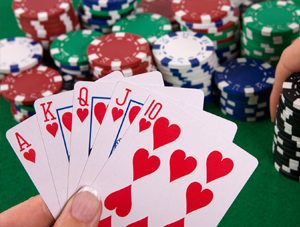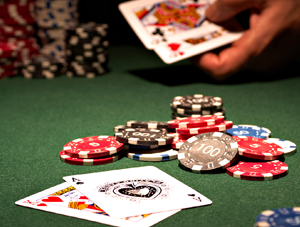5 Pro Poker Tips for Online Poker players
If you want to play Poker like a pro, then you need these top tips to get you on the right track.
1. Know When to Hold'em
Pro poker players rely on two skills that anyone serious about playing poker online needs to master: an understanding of the game’s odds, and observation of fellow players. Once you are comfortable enough with card and hand values to start focusing on more than the hand in front of you, start observing both the players around you and, in games like Texas Hold’em and 7-Card Stud, the other cards visible on the table.
Knowing which cards have been dealt from the 52-card deck helps you work out the relative strength of your hand. If learning poker hands is a priority, you can also play video poker at a CAD casino, as this is a quick way to learn the value of different hands and master hand rankings. Additionally, if you’ve done some basic reading on statistics, you should be able to form a better idea of which opponents’ hands may have the potential to beat yours.
Once you’ve watched other players for a while, you may also be able to pick up the tells that show when they’re bluffing, or the signs that indicate they’re sitting on a really strong hand, but trying to underplay it to lure in more bets.
2. Know When to Fold ’em
This is probably the most important lesson for beginners to learn in poker: you do NOT have to play every hand. Do a little research on the form of poker you want to play, and follow expert advice on what constitutes a hand worth opening on, and what the criteria for continuing to bet on it should be.
Pros know that the way to succeed in poker is to bet big on your strong hands, with the occasional bluff when you’re sure your opponent’s hand isn’t strong enough to call you. If you find yourself playing more than 50% of the hands you’re dealt, you may need to tighten up your strategy and raise the bar on an opening hand.
Bluffing for the sake of bluffing, especially on no-limit games, is a great way for a novice to become a broke, former poker player quickly. Once they work out you’ll bet on practically anything just to try and intimidate them, experienced poker players will take you to the cleaners.
3. Know When to Walk Away
Folding immediately on a bad hand is a good strategy. However, if a hand is good enough to open on, but the subsequent cards don’t produce the result you needed, don’t fall into the typical gambler’s trap of refusing to abandon what you’ve wagered so far, either.
If you don’t think you can win a hand and your opponent has made a confident raise, calling to make sure that their hand really could beat yours, rather than folding, is a pointless waste of your money.
4. Know When To Run
Poker is a game that requires focus and concentration: on your hand, on the other cards on the table, and on the behaviour of other players. If you’re in a bad mood, stressed out by work, or distracted by personal worries, and especially when you’re intoxicated, stay far away from the poker table.
5. Count Your Money When the Dealing’s Done
With apologies to Kenny Rogers: poker is supposed to be a fun diversion, played with money you can afford to lose. Yes, sometimes it also results in big wins: but playing because you desperately need the winnings is a recipe for disaster.
So pick a game with stakes and limits you can afford, and set yourself a cast-iron budget, which you never exceed. That way, you get to concentrate on playing the best poker you can, rather than constantly checking the size of your chip pile.





